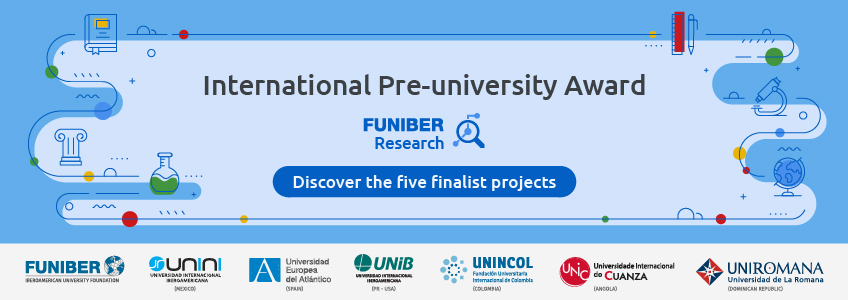The Iberoamerican University Foundation (FUNIBER), through its Social Action area, announces the five finalists of the first phase of the International Pre-University Award – FUNIBER Research.
Among the 25 research projects received, a team composed of professors from the academic network in which FUNIBER participates has reviewed and selected the five finalist projects that will move on to the next stage of the Award.
The selection of the papers was based on originality, creativity, academic rigor, as well as the relevance and pertinence of the subject matter.
The five finalist projects are:
- “Recuperação do Cerrado: Implementation of a Native Seedling Greenhouse as a Preservation and Environmental Education Strategy” (Recovering the Cerrado: Implantação de uma Estufa de Mudas Nativas como Estratégia de Preservação e Educação Ambiental) – CEPI Oemis Virginio Machado, Brazil.
- “Fitorremediación y filtración de aguas contaminadas del río Machángara, Quito – Ecuador” (Phytoremediation and filtration of contaminated water from the Machángara River, Quito – Ecuador) by students from the Colegio ISM North, Ecuador.
- “Establecimiento de meliponarios de abejas nativas sin aguijón (ansa) con grado sexto en el Colegio Gimnasio Campestre de la ciudad de Ibagué” (Establishment of meliponaries of stingless native bees (ansa) with sixth grade at Colegio Gimnasio Campestre in the city of Ibagué) – Colegio Gimnasio Campestre, Colombia.
- “Propuesta de un experimento para validar condiciones de vida bacteriana metanófila en Titán y su uso para combatir el combatir el cambio climático” (Proposal of an experiment to validate methanotrophic bacterial life conditions on Titan and its use to combat climate change) – Colegio Alemán Alexander von Humboldt in Mexico
- “Trastorno de ansiedad social en adolescentes del colegio Gimnasio Campestre” (Social anxiety disorder in adolescents of colegio Gimnasio Campestre) – Colegio Gimnasio Campestre, Colombia
Next phase
The finalist projects will have to make an oral defense of their work before the jury on February 18. The presentation will take place in virtual mode. The finalist project that is not present at the oral defense will not be awarded.
Awards
After the oral defense, the jury will select the winning papers. The research work awarded first place will receive a prize of 400 dollars for the authors and 250 dollars for the school. The research work awarded second place will receive a prize of 200 dollars for the authors and 125 dollars for the school.
A scholarship will be awarded by the Iberoamerican University Foundation to the professor responsible for the winning projects, with a 70% financial aid to study one of the online postgraduate programs or 60% to study an online doctoral program promoted by FUNIBER and certified by one of the network’s universities.
All finalists will receive a diploma of recognition.
The first- or second-place winning students who subsequently want to study in one of the network’s universities, whose programs are sponsored by FUNIBER, will also receive a registration fee waiver.
International Pre-University Award – FUNIBER Research
The FUNIBER Research Prize is supported by the Universidad Europea del Atlántico (European University of the Atlantic), the Universidade Internacional do Cuanza (International University of Cuanza, UNIC), the Universidad Internacional Iberoamericana (International Iberoamerican University, UNINI-Mexico), the Fundación Universitaria Internacional de Colombia (International University Foundation of Colombia, UNINCOL), the Universidad de La Romana (University of La Romana, UNIROMANA), and the Universidad Internacional Iberoamericana (International Iberoamerican University, UNIB).
The purpose is to encourage research and knowledge with a positive social impact. The purpose of this call is to reward works that research transformation proposals for current challenges. Our purpose is to reinforce the ethics and commitment of future professionals to society and the awareness of the social impact of science. As well as promoting critical and scientific thinking among the younger generations.
The topics addressed sought solutions framed within the sustainable development goals of the 2030 Agenda.
